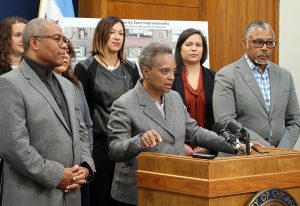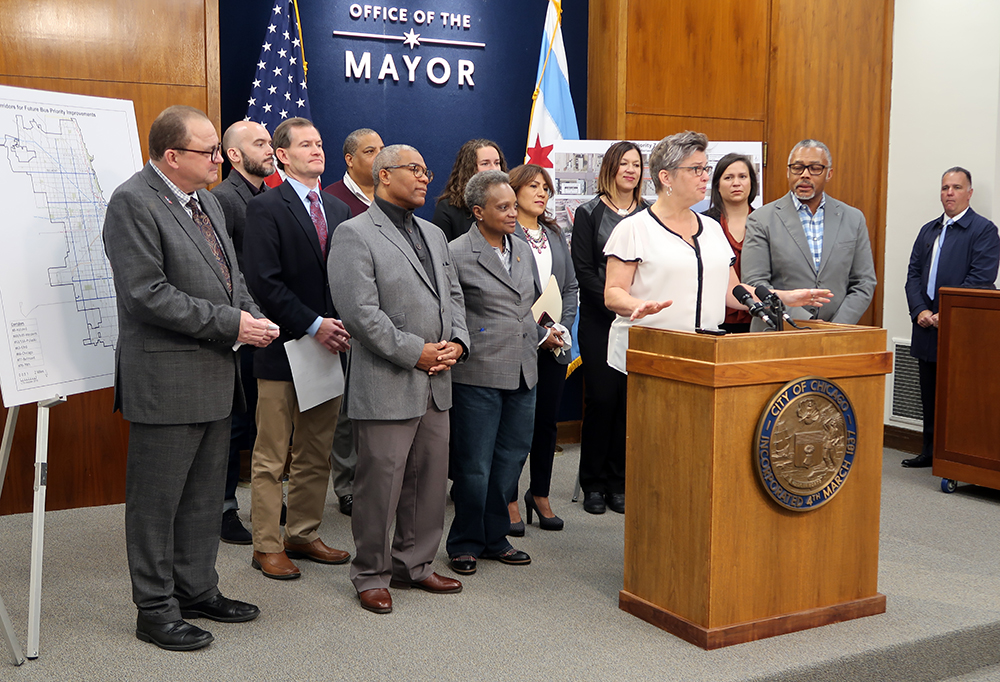UPDATE (11/26/19): Mayor Lightfoot’s budget passed Chicago’s City Council, including new fees on Uber and Lyft.
Mayor Lightfoot announced Friday she’ll use a portion of the revenue from new downtown ride-hailing fees to help expand Chicago’s network of bus priority streets. This is good news for anyone who wants better bus service and less congestion on Chicago streets.
Chicago residents: tell Mayor Lightfoot and your alderman you support fair fees and better bus service.
Active Trans Interim Executive Director Melody Geraci’s delivered some remarks at the announcement press conference with the Mayor (see photo left and video).
BUS PRIORITY ZONE EXPANSION
The Mayor’s plan upgrades bus service on five of the city’s busiest routes: #8 Halsted, #49 Western, #53 Pulaski, #63 63rd Street, and #77 Belmont. Improvements include partial dedicated lanes, better bus stops, and traffic signal changes to boost bus speed and reliability.
In addition to the revenue from the new ride-hailing fees, the bulk of the funding for the upgrades comes from the federal Congestion Mitigation and Air Quality (CMAQ) program. The city completed similar upgrades on the #79 79th Street and #66 Chicago Avenue routes — the system’s two busiest — in 2019.
Today’s announcement is the latest win in our Back on the Bus campaign for faster, more reliable service citywide. The campaign launched in 2017 calling on elected officials and agency leaders to take action to reverse steep bus ridership declines.
In 2018 we released Chicago’s first-ever Bus Friendly Streets Report Cards demonstrating how a lack of bus lanes and other bus priority features have contributed to the ridership drop.
This summer Active Trans urged Mayor Lightfoot to fund improvements on at least three high-ridership routes in her 2020 budget. As a candidate, she committed to building at least 50 miles of bus priority streets in her first term.
The expansion of Bus Priority Zones is great news for Chicago transit riders. Investments like these make bus service faster and more reliable, helping ease congestion, reduce emissions, and make a more just and equitable transit system. A healthy and growing bus system is critical to the future of Chicago neighborhoods.
RIDE-HAILING FEE CHANGES

To help fund the expansion, the Mayor proposes increasing the existing flat 72-cent fee on solo Uber and Lyft trips to $1.25 and decreasing the fee for shared trips to 65 cents citywide. In addition, the plan would add a surcharge of $1.75 for solo trips and 65 cents for shared trips that start or end in a new “downtown congestion zone” between 6 a.m. and 10 p.m.
The zone includes the Central Business District and extends north to North Avenue, south to Roosevelt, and includes most of the West Loop.
The fee changes are part of the Mayor’s 2020 budget proposal that will be reviewed and voted on by the City Council in November.
These new fees are a good first step in accounting for the community impacts of driving or riding alone — especially in the city’s most congested areas. In July Active Trans joined a coalition of advocates in calling on Mayor Lightfoot to make the city’s ride-hailing fee more equitable and analyze possible congestion pricing options. We provided feedback to the Mayor’s Office as they developed the plan for new fees.
Ride-hailing growth downtown makes our streets less safe and our air less clean. It’s contributed to declines in bus ridership and hurt transit agency revenue — increasing the likelihood of service cuts and fare increases citywide. More regulation is needed to limit the negative impacts of ride-hailing and maximize its benefits, such as bringing a new mobility option to the city’s transportation deserts.
We applaud Mayor Lightfoot for taking a bold first step to address the inequity in our transportation system. These new fees will help ease congestion and reduce emissions on many of the city’s busiest corridors. When paired with the expansion of Bus Priority Zones, these changes will make it safer and easier to walk, bike, and ride transit in neighborhoods across the city.
CONGESTION PRICING STUDY
Longer-term, Mayor Lightfoot committed to studying a broader congestion pricing approach that considers all vehicles — privately-owned cars, taxis, ride-hailing vehicles, and trucks. Such a policy could have transformative impacts on community health, safety, sustainability, and equity. It would be a major step in rolling back decades of subsidies that created our car-dependent city.

